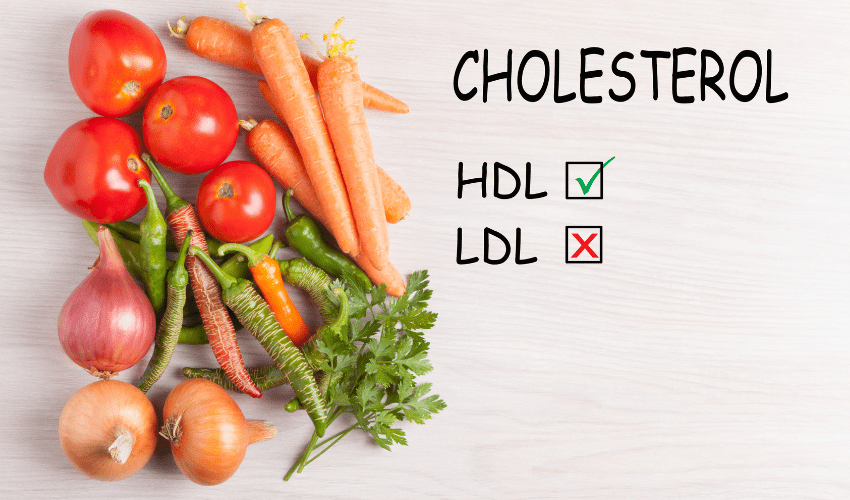Cholesterol has become the most discussed health topic for the past several decades. As usual, there are hundreds of opinions on what we should do, not do, tricks to increase/decrease. Pills to take or not take. I am not going to try to convince you one way or another. Instead, I want to discuss the role that cholesterol plays in the body. Why it is there . What is it doing. And where it comes from. Then, you can make your own decision. For decades now, we have been told that high cholesterol leads to heart disease. This is a But is it true? Is cholesterol really that damaging to our health? |
The History of the "Cholesterol Problem"
Research from the 1950’s and 60’s has led us to believe that the cholesterol we consume will stick to the lining of our arteries and make it harder for our heart to pump blood throughout our bodies.
This rhetoric has caused millions of people to reduce their consumption of eggs, meat, and dairy. Due to fear that it would eventually raise their cholesterol so high that a heart attack would occur.
It also resulted in the creation of an entire industry dedicated to low-fat and fat-free food products. These were designed with the sole purpose to help Americans reduce their cholesterol levels.
But it did not improve the “Cholesterol Problem”. So then, more drastic measures were taken.
The pharmaceutical giants created popular “statin” drugs to help lower cholesterol with the ease of simply popping a pill.
This has become common practice in our culture. Around 25% of Americans over the age of 45 take statin medications. All in pursuit of avoiding a heart attack.
Our Bodies Need Cholesterol
If cholesterol is so bad for us, why do our bodies naturally produce so much of it?
Our livers create 75-80% of the cholesterol present in our bodies. Only 20% of our cholesterol comes from the foods we eat. This naturally generated cholesterol is designed by the body to help the cells function and maintain optimal health.
Cholesterol is also essential for feeding the neurons in our brain so that we experience proper brain function.
Consider this fact:
Our brains contain 25% of the total cholesterol in our body.
So by reducing our cholesterol levels, we are also reducing brain function.
There is a correlation between low levels of cholesterol, memory loss, and Alzheimer’s disease.
(Why do you think that depression is a common side effect of statin medication?)
Cholesterol is also incredibly important in producing the stress hormone cortisol, as well as sex hormones, such as estrogen, progesterone, and testosterone. It helps your body create bile acids in order for you to digest fat. In addition, cholesterol transforms the sunlight your body is exposed to into vitamin D.
The Real Culprit
When our bodies are injured, it causes inflammation. Inflammation then turns into scars that line the inside of our blood vessels.
When you live a lifestyle that causes continuous damage to the vessels, build-up of plaque occurs. It is this plaque build-up that can potentially lead to high blood pressure and heart attacks.
The real question should be:
“What’s causing the damage to our arteries and how do we prevent plaque build-up?”
Two key factors in arterial damage and plaque build-up NEED to be discussed.
• Sugars – specifically sucrose (table sugar) and high fructose corn syrup (HFCS). Because they cause chronic inflammation within our bodies, which results in plaque forming.
• Low-density Lipoprotein (LDL) – The “bad” cholesterol. Which can also contribute to inflammation and plaque formation when oxidative stress and sugar get involved.
Understanding HDL Vs. LDL
The conversation about HDL vs. LDL isn’t really about cholesterol at all; rather these are the terms to describe the specific protein particles that cholesterol molecules cling to in order to travel through the bloodstream.
High-density lipoprotein (HDL) has been characterized as “good” cholesterol because it has the potential to prevent heart disease. The HDL works to move cholesterol away from the arteries and back to the liver to be recycled.
LDL has been coined the “bad” cholesterol, because some LDL particles have the capability of causing damage in our arteries, which leads to inflammation and plaque. Only then do you end up with damage to the artery and plaque.
With that said, if someone is told they have high cholesterol, it does not necessarily mean they are destined for heart disease. In fact, if you have damage and inflammation caused by sugar and stress, it really doesn’t matter that your LDL is low. Heart disease is still a major risk when you have a lot of small LDL particles.
There are a plethora of further tests that can be done to determine a person’s risk for heart disease rather than simply looking at total cholesterol, particularly by analyzing the particle size of the LDL in the bloodstream.
Failed Cholesterol Treatments
The sad reality of today is, that all too often people are said to have high cholesterol and are immediately told to limit the number of fats they eat. They are prescribed cholesterol-lowering drugs, know as statins, as the solution.
Unfortunately, this is a very dangerous combination for our health. Even though statins are intended to prevent heart disease by lowering cholesterol, studies show that despite lower cholesterol numbers and lower LDL, the risk is actually increased.
The body becomes depleted of CoQ10. Which could result in acute heart failure. In addition, statins also prevent the creation of vitamin K2. Which helps regulate calcium within our bodies and prevents calcification from taking place in the arteries.
Without K2, plaque levels can become dangerously high and grow the risk for heart disease.
The fact that statins have continually proved to be dangerous to one’s health, (despite being some of the most widely prescribed drugs in the world), is evidence of the power pharmaceutical companies have.
Even though there are hundreds of studies that demonstrate the negative impact statins can pose, those reports are rarely publicized.
According to a recent report in the Expert Review of Clinical Pharmacology, statin promoters used a statistical method known as relative risk reduction (RRR) to make statins’ results look much more impressive than what the overall results would suggest.
These same results show that if you look at the absolute risk,
Statins benefit only one out of every hundred people taking the drug.
What Can Be Done?
If statins aren’t the answer, then what can be done?
The suggestion of cutting out cholesterol-rich foods as an attempt to limit LDL particles from entering our arteries is a frequently touted step. But, oftentimes those foods are nutrient-packed and deserve a place in our diet.
In fact, some of the healthiest foods we can eat are rich in cholesterol.
For example, it has been a widely accepted belief for years that consuming egg yolks, (which are high in cholesterol), should be limited. However, the newest set of U.S. Dietary Guidelines now recommends egg yolks as a recommended source of protein because the Dietary Guidelines Advisory Committee no longer considers cholesterol to be a nutrient of concern.
Remember how everyone was told to use margarine rather than butter because it is healthier?
That’s not true either!
Butter is actually full of nutritious and wholesome fats (especially when it’s raw, organic butter that comes from grass-fed cows.) The saturated fats found in butter have been known to raise HDL, which we know to be good.
Butter was originally thought to be unhealthy because it also raises LDL. But after further investigation, it has been discovered that eating these saturated fats not only raises the level of the large, non-damaging LDL particles, it also causes the small LDL (the ones that could clog your arteries) particles to grow into the safer, larger ones.
Time For A Change
If you are looking to optimize your cholesterol, forget the no-fat and low-fat diets!!
It’s time to start incorporating good, healthy fats, back into your diet.
Trade out all of the processed foods (which are high in refined sugars and carbs), for organic whole foods.
Most importantly, consider what statins are really doing to your health.
By opting for a more natural approach, you can save yourself from the extensive adverse effects these drugs are known to produce.
So it turns out I did try to convince you after all! 😉
The saddest part of this is, all of this information about how healthy fat and cholesterol are being used in the body and how to control it is taught in entry-level biology classes. Yet somehow it is missed when we talk to the specialists.
Chat Soon!
Dr. Sauer

Are you sick and tired of being sick and tired? Do you feel confused about exactly what to do to make a difference in getting your health back? There is hope, you can turn your health and vitality around. Give Julie a call to see if a lifestyle approach would be right for you. 701-356-3255 |






